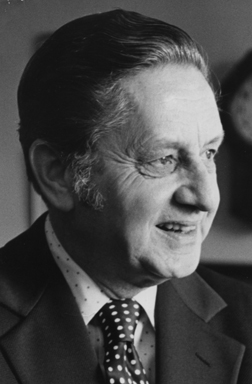Wabash College mourns the loss of Dr. William J. “Bill” Haines ’40, who passed away Wednesday morning.
A funeral service will be held at 11:00 a.m. on Saturday, February 20 at Thompson Memorial Presbyterian Church in New Hope, Pennsylvania. Calling will be held on Friday, February 19 at Leaver Cable Funeral Home in Buckingham, Pennsylvania.
Bill served the Board of Trustees faithfully from 1972 through 1993, and had served the College as Emeritus Trustee over the last two decades.

“He was the epitome of a Wabash gentleman in the various communities in which he lived, and he was the model of a liberally educated scientist and business leader,” said Wabash President Patrick E. White.
He was preceded in death by his wife, Wilma “Shorty,” who passed away in 1998.
Bill left his mark at Wabash as an undergraduate, to be sure. He was an Honor Scholar who was born and raised in the shadow of the campus on Russell Street. He was president of the freshman and senior classes at Wabash, vice president of Senior Council, and directed the Wabash concert band. He had few peers as a scholar. He majored in chemistry and double-minored in mathematics and zoology. Elected to Phi Beta Kappa in his junior year, Bill received the John Maurice Butler Prize, was valedictorian of the Class of 1940, and was the Commencement speaker.
He enrolled at the University of Illinois for graduate school and became the first Wabash graduate ever to earn a Ph.D. in biochemistry. Just over half a century later, Bill endowed the
William J. and Wilma M. Haines Professor in Biochemistry at Wabash — a position now held by Wabash’s first biochemistry professor, Ann Taylor.
“I was deeply saddened to hear of Bill's passing,” said Professor Taylor. “His vision of supporting student work in biochemistry and bringing cutting edge research to campus through a speakers series has enhanced Wabash in wonderful ways. Whenever I have talked to him, he wanted to know what was up in the lab and how the students were doing. He was always glad to hear of graduate school placement and other successes of our students.”
Bill began his career as a biochemist at the Upjohn Company in Kalamazoo, Michigan, where he was a researcher, group leader, and director of the Endocrinology Department. In 1954, he moved to Armour Labs, where he spent five years as technical director before beginning his career at Johnson & Johnson.
Bill rose quickly through the ranks at Johnson & Johnson, serving as Vice President of Research and Executive Vice President of the Ortho Pharmaceutical Corporation, a division of J&J, for 13 years. He was named Vice Chairman of Johnson & Johnson International in 1967, and two years later became a member of the J&J board of directors and executive committee. He was responsible for McNeil Laboratories and Pitman-Moore, Inc. in both the United States and Canada and developed and acquired a number of European companies, including seven Cilag-Chemi companies, five Janssen companies, and the Molter Company. Prior to his retirement in 1982, he served Johnson & Johnson as Corporate Vice President of Science and Technology.
Wabash honored Dr. Haines with an honorary degree in 1970, and he received an Alumni Award of Merit from the National Association of Wabash Men in 1973. In addition to his service to Wabash, Bill served on the Hood College Board of Trustees and was a trustee of the Joslin Diabetes Foundation.
He was active throughout his life in the American Chemical Society, the Presbyterian Church, as well as numerous service clubs, school boards, and non-profit organizations. He was chairman of the Research and Development Section of the Pharmaceutical Manufacturers Association and was Chairman of the Society of Chemical Industry. He was a Fellow in the American Academy for the Advancement of Science and the American Institute of Chemists, and was a charter member of the International Society for Research in the Biology of Reproduction.
“Bill was also a true Little Giant,” added Professor Taylor. “His leadership and forethought in endowing biochemistry at Wabash will have lasting impact on the department — and college — for years to come.
 “He was the epitome of a Wabash gentleman in the various communities in which he lived, and he was the model of a liberally educated scientist and business leader,” said Wabash President Patrick E. White.
“He was the epitome of a Wabash gentleman in the various communities in which he lived, and he was the model of a liberally educated scientist and business leader,” said Wabash President Patrick E. White.